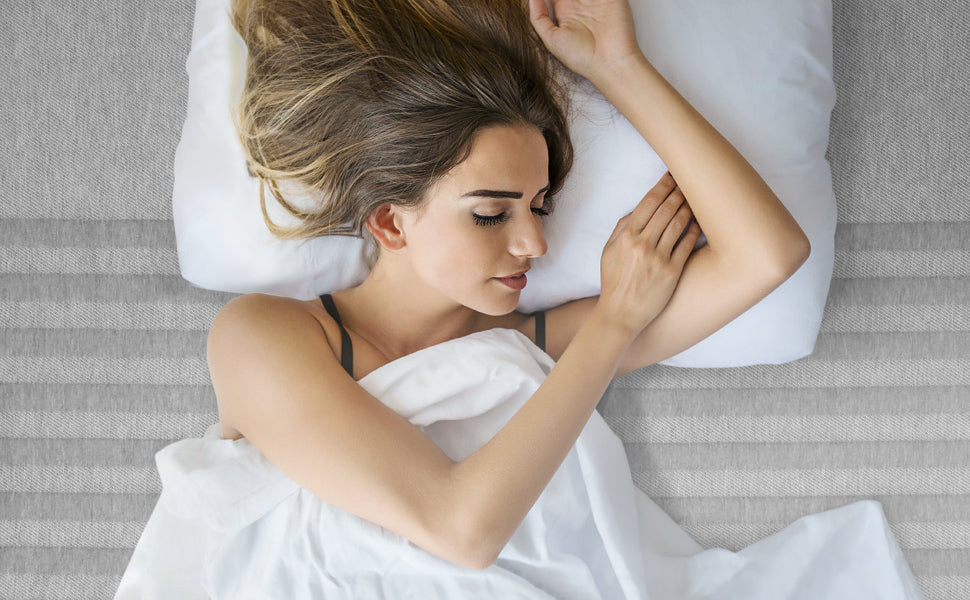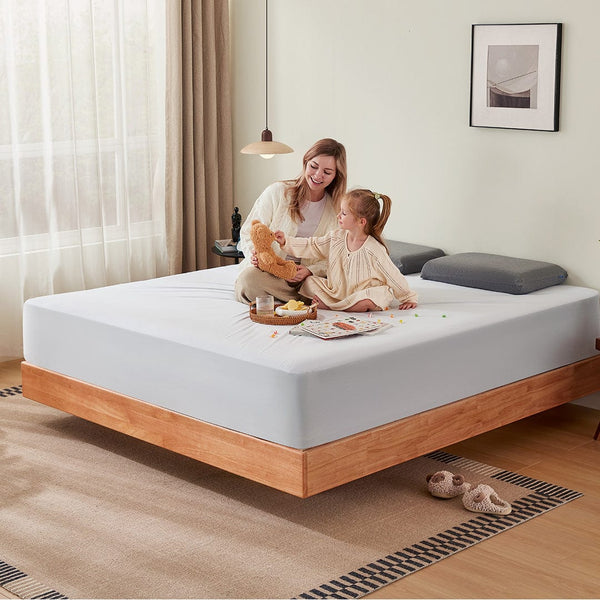Sleeping naked does have many benefits, and if it helps you get enough sleep each night, it's worth trying. However, sleeping naked is not suitable for everyone, especially those with sensitive skin, as it can be detrimental to their health.
Everything You Need to Know about Sleeping Nude [2025]
Some people believe that sleeping naked can help improve sleep quality and achieve rapid sleep onset, especially for hot sleepers, as it seems to be an effective way to relieve heat. Some even believe that sleeping naked can help with weight loss; but is that really the case?
What are the advantages and disadvantages of sleeping naked, and how can you achieve healthy naked sleep? Read on to learn everything you want to know.

In this article
The Pros & Cons of Sleeping Naked
1.1 The Benefits of Sleeping Naked
Make you fall asleep quickly and sleep better
Your body's natural sleep-wake cycle is closely tied to temperature fluctuations governed by your circadian rhythm – the internal biological clock that regulates physiological processes. A critical component of this rhythm involves cyclical warming and cooling patterns throughout the day. As evening approaches and fatigue sets in, your body initiates two key changes: increased melatonin production and a gradual decrease in core temperature, both of which continue throughout the night.
Scientific research indicates that maintaining a bedroom environment between 66-70°F (19-21°C) optimizes sleep quality, as cooler conditions align with your body's thermal requirements for rest. Elevated nighttime temperatures can disrupt this process, potentially fragmenting sleep. This thermal relationship explains why some sleep specialists advocate for sleeping without clothing – reducing insulation barriers may accelerate the natural cooling of core body temperature, thereby facilitating faster sleep onset and potentially enhancing sleep continuity. The practice essentially works synergistically with your circadian rhythm's temperature regulation mechanism to support restorative rest.
Reduce stress and anxiety
Sleeping naked may reduce stress and anxiety by improving sleep quality, which is closely linked to emotional health. Research shows poor sleep worsens depressive symptoms, while chronic stress disrupts sleep, creating a harmful cycle. By enhancing the body’s natural cooling process, sleeping naked supports deeper, more restorative sleep. This helps regulate mood and lowers stress hormones, promoting mental well-being over time. Better sleep hygiene—including temperature regulation—can break the stress-insomnia cycle, making quality rest a key factor in emotional resilience.
Lose weight
Mang people want to know "does sleeping naked help lose weight", the answer is yes, sleeping naked may support weight loss by improving sleep quality through better temperature regulation. Research shows that about 74% of U.S. adults are overweight or obese, while roughly 40% struggle with sleep issues. Since poor sleep disrupts metabolism and hunger hormones, optimizing rest can aid weight management.
Reduce the risk of chronic conditions like type 2 diabetes
Sleeping naked may help reduce the risk of chronic conditions like type 2 diabetes and heart disease by improving sleep quality. A 2016 review shows insufficient sleep is linked to higher diabetes risk, which subsequently increases cardiovascular disease likelihood. Since proper sleep helps regulate blood sugar and metabolic function, sleeping nude—by promoting faster sleep onset and uninterrupted rest through optimal temperature regulation—could serve as a simple preventive measure. Better sleep patterns may thus play a protective role against these interconnected health risks.
1.2 The Disadvantages of Sleeping Naked
Now that we've discussed the benefits of sleeping naked, let's explore who might not be suitable for this practice and what potential drawbacks it may have.
1. Increased Risk of Infections
Sleeping without clothing exposes the genital area to bacteria and fungi, mainly if bedding hygiene is suboptimal. Women who slept naked had a higher incidence of vulvovaginal yeast infections due to reduced airflow and moisture retention, which creates an environment conducive to microbial growth Similarly, men may face an elevated risk of urinary tract infections (UTIs) or jock itch if bedding is not regularly cleaned, as pathogens like E. coli and Candida thrive in warm, moist conditions.
2. Temperature-related discomfort and Health Risks
Although cooling the body aids sleep initiation, excessive temperature drops can disrupt sleep cycles. A 2018 review in Sleep Medicine Reviews highlighted that sudden skin cooling (e.g., from sweat evaporation or cold rooms) triggers micro-awakenings, reducing sleep continuity. Prolonged exposure to cold environments during nude sleep may also increase susceptibility to respiratory illnesses like the common cold, as lowered core temperatures temporarily suppress immune function.
3. Skin Irritation and Allergic Reactions
Direct skin contact with bedding materials increases exposure to allergens such as dust mites, pet dander, and detergent residues. A 2021 study shows that unwashed bedding harbours up to 1.5 million dust mites per gram of dust, exacerbating eczema, contact dermatitis, and allergic rhinitis in sensitive individuals. Additionally, synthetic fabrics or harsh detergents can cause mechanical friction and chemical irritation, leading to redness and itching.
Tips For Sleeping Naked Healthfully
- Maintain impeccable bedding hygiene by laundering your sheets, pillowcases, and duvet covers at least once a week. Opt for hypoallergenic detergents to minimize potential skin irritations.
- Select a clean, breathable, comfortable, and temperature-regulating mattress protector to promote a healthy and enjoyable naked sleeping experience.
- Prioritize Comfort: Ensure your mattress and pillows align with your comfort needs to avoid pressure points or discomfort.
- Keep your bedroom cool (around 60–67°F or 15–19°C) to enhance sleep quality and avoid night sweats. Alternatively, you can add a cooling mattress topper (https://newentor.com.au/products/topper-cooling) to your existing mattress for extra comfort—an ideal choice for those prone to feeling hot.
- Moisturize Dry Skin: Apply a light, non-greasy moisturizer before bed if your skin tends to dry out, but avoid heavy creams that might stain bedding.
FAQs about Sleeping Nude
Does sleeping naked increase testosterone?
According to the research, Sleeping nude may boost nighttime testosterone production in men. Because tight underwear can raise body temperature, disrupting hormone secretion and potentially compromising sleep quality. And the cooling effect of sleeping nude might contribute to improved sperm health.
Is it good to sleep in the nude?
Overall, as long as bedding hygiene is maintained through regular cleaning of sheets, pillowcases, and covers, sleeping naked offers more benefits than drawbacks. It helps individuals with insomnia and heat-sensitive people fall into deep sleep faster and significantly improves sleep quality.
Besides sleeping nude, what else can improve my sleep quality?
Follow the 10-3-2-1-0 Rule:
- 10 hours before bedtime: Avoid caffeine.
- 3 hours before bed: Limit alcohol and food.
- 2 hours before bed: Relax and avoid mentally demanding tasks.
- 1 hour before bed: Put away electronics.
- 0: Aim for zero snooze button hits in the morning.
This method helps regulate your circadian rhythm and promotes restful sleep!
Botton Lines
While sleeping naked may aid thermoregulation and melatonin production for deeper sleep, but for healthy nude sleep, pair breathable bedding like Newentor waterproof mattress protector— hypoallergenic, skin-friendly, and machine-washable to shield against allergens and sweat.
Newentor Waterproof Mattress Protector






















